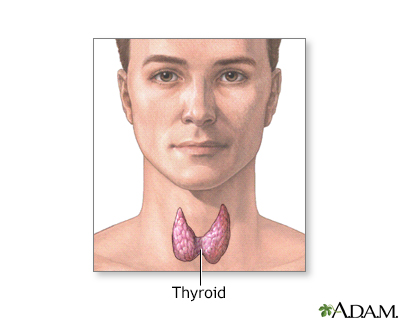Thyroid cancer - medullary carcinoma
Thyroid - medullary carcinoma; Cancer - thyroid (medullary carcinoma); MTC; Thyroid nodule - medullary
Medullary carcinoma of the thyroid is cancer of the thyroid gland that starts in cells that release a hormone called calcitonin. These cells are called "C" cells. The thyroid gland is located inside the front of your lower neck.
Images


I Would Like to Learn About:
Causes
The cause of medullary carcinoma of the thyroid (MTC) is unknown. MTC is very rare. It can occur in children and adults.
Unlike other types of thyroid cancer, MTC is less likely to be caused by radiation therapy to the neck given to treat other cancers during childhood.
There are two forms of MTC:
- Sporadic MTC, which does not run in families. Most MTCs are sporadic. This form mainly affects older adults.
- Hereditary MTC, which runs in families.
You have an increased risk for this type of cancer if you have:
- A family history of MTC
- A family history of multiple endocrine neoplasia (MEN)
- A prior history of pheochromocytoma, mucosal neuromas, hyperparathyroidism or pancreatic endocrine tumors
Other types of thyroid cancer include:
- Anaplastic carcinoma of the thyroid
- Follicular carcinoma of the thyroid
- Papillary carcinoma of the thyroid
- Thyroid lymphoma
Symptoms
MTC often begins as a small lump (nodule) in the thyroid gland. There also may be lymph node swelling in the neck. As a result, symptoms may include:
- Swelling of the neck
- Hoarseness
- Breathing problems due to narrowing of airways
- Cough
- Cough with blood
- Diarrhea due to high calcitonin level
Exams and Tests
Your health care provider will perform a physical exam and ask about your symptoms and medical history.
Tests that may be used to diagnose MTC include:
- Calcitonin blood test
- CEA blood test
- Genetic testing
- Thyroid biopsy
- Ultrasound of the thyroid and the lymph nodes of the neck
- PET scan
People with MTC should be checked for certain other tumors, especially pheochromocytoma and parathyroid tumors and parathyroid tumors.
Treatment
Treatment involves surgery to remove the thyroid gland and surrounding lymph nodes. Because this is an uncommon tumor, surgery should be performed by a surgeon who is familiar with this type of cancer and experienced with the operation required.
Further treatment will depend on your calcitonin levels. A rise in calcitonin levels again may indicate new growth of the cancer.
- Chemotherapy and radiation do not work very well for this type of cancer.
- Radiation is used in some people after surgery.
- Newer targeted therapies may reduce tumor growth also. Your provider can tell you more about these, if needed.
Near relatives of persons diagnosed with hereditary forms of MTC are at increased risk of this cancer and should discuss with their providers.
Support Groups
You can ease the stress of illness by joining a cancer support group. Sharing with others who have common experiences and problems can help you not feel alone.
Outlook (Prognosis)
Most people with MTC live at least 5 years after diagnosis, depending upon the stage of the cancer. The 10-year survival rate is 65%.
Possible Complications
Complications may include:
- Cancer spreads to other areas of the body
- Parathyroid glands are accidentally removed during surgery
When to Contact a Medical Professional
Contact your provider if you have symptoms of MTC.
Prevention
Prevention may not be possible. But, being aware of your risk factors, especially your family history, may allow for early diagnosis and treatment. For people who have a very strong family history of MTC, the option to remove the thyroid gland may be recommended. You should carefully discuss this option with a doctor who is very familiar with the disease.
Related Information
MalignancyThyroid function tests
Pheochromocytoma
Hyperparathyroidism
Thyroid cancer - papillary carcinoma
Anaplastic thyroid cancer
Thyroid cancer
Hodgkin lymphoma
Metastasis
Thyroid nodule
References
Kim M, Kim BH. Current guidelines for management of medullary thyroid carcinoma. Endocrinol Metab. 2021;36(3):514-524. PMID: 34154310 pubmed.ncbi.nlm.nih.gov/34154310/.
National Cancer Institute website. Thyroid cancer treatment (PDQ) - health professional version. www.cancer.gov/types/thyroid/hp/thyroid-treatment-pdq. Updated April 11, 2024. Accessed May 3, 2024.
Pearce EN, Hollenberg AN. Thyroid. In: Goldman L, Cooney KA, eds. Goldman-Cecil Medicine. 27th ed. Philadelphia, PA: Elsevier; 2024:chap 207.
Suh I, Sosa JA. Thyroid. In: Townsend CM Jr, Beauchamp RD, Evers BM, Mattox KL, eds. Sabiston Textbook of Surgery. 21st ed. St Louis, MO: Elsevier; 2022:chap 37.
BACK TO TOPReview Date: 3/31/2024
Reviewed By: Todd Gersten, MD, Hematology/Oncology, Florida Cancer Specialists & Research Institute, Wellington, FL. Review provided by VeriMed Healthcare Network. Also reviewed by David C. Dugdale, MD, Medical Director, Brenda Conaway, Editorial Director, and the A.D.A.M. Editorial team.

Health Content Provider
06/01/2025
|
A.D.A.M., Inc. is accredited by URAC, for Health Content Provider (www.urac.org). URAC's accreditation program is an independent audit to verify that A.D.A.M. follows rigorous standards of quality and accountability. A.D.A.M. is among the first to achieve this important distinction for online health information and services. Learn more about A.D.A.M.'s editorial policy, editorial process and privacy policy. A.D.A.M. is also a founding member of Hi-Ethics. This site complied with the HONcode standard for trustworthy health information from 1995 to 2022, after which HON (Health On the Net, a not-for-profit organization that promoted transparent and reliable health information online) was discontinued. |
The information provided herein should not be used during any medical emergency or for the diagnosis or treatment of any medical condition. A licensed medical professional should be consulted for diagnosis and treatment of any and all medical conditions. Links to other sites are provided for information only -- they do not constitute endorsements of those other sites. © 1997- 2025 A.D.A.M., a business unit of Ebix, Inc. Any duplication or distribution of the information contained herein is strictly prohibited.
